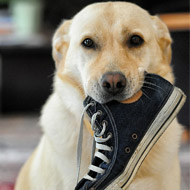
New research reveals the state of our nation’s dogs
Dogs with problem behaviours are costing the average UK dog owner £353 a year, equating to £4,000 over the dog’s lifetime, according to new research.
The figures, published by Dogs Trust, reveal that the most damaged items are shoes, with almost 45 per cent of dog owners replacing at least one pair a month.
Clothing (38 per cent), children’s toys (20 per cent) and documents for work (18 per cent) follow closely behind.
Furthermore, the research shows that almost a million of the 8.5 million dogs in the UK have had no formal training. Almost a third of owners reported coming home to find that their dog had destroyed something, toileted or had been barking.
Commenting on the nation’s need for better trained dogs, Dogs Trust director of canine behaviour and research, Rachel Casey, said:
“Behaviour problems are a massive welfare issue for dogs: they are the most common reason for dogs to be relinquished to Dogs Trust. Dogs Trust School was set up to deal with problem at the source. We want to give owners the information and skills to be able to live happy and fulfilling lives with their dogs.”
Although some dog owners are paying out almost £4,000 throughout their dog’s lifetime as a result of their pet’s behaviour, 85 per cent have never sought professional advice.
When it comes to going out, one in five owners are scared to let their dog off the lead. Of those that are, almost 60 per cent of dogs do not always return when called by their owners.
Some of the top places owners do not like to go with their dog in case they misbehave are restaurants, crowded events and shops.
Image (C) Pixabay



 The latest
The latest